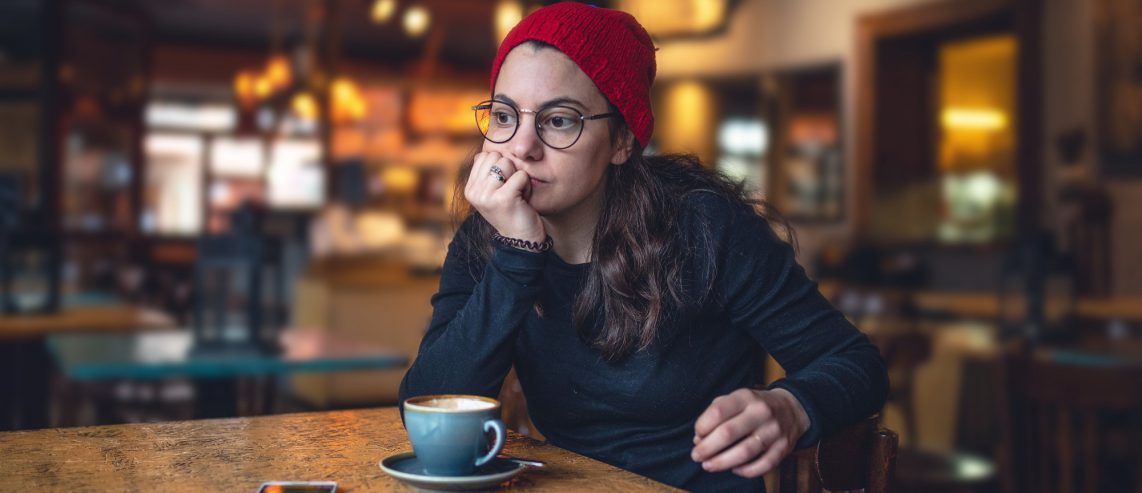People who are LGBTQIA+ face many different challenges in their lives, including the impact of mental health burdens. LGBTQIA+ people are at a higher risk of anxiety, depression, and many other mental health conditions.
One challenge for LGBTQIA+ people is fear or anxiety in social situations. This is known as social anxiety disorder.
Living with social anxiety is often difficult, but overcoming it is possible.
New Here - Mental Health
What Is Social Anxiety Disorder?
Social anxiety disorder is a condition that causes people to feel fearful or anxious in social situations. It can cause both physical and mental symptoms. These symptoms can last for six months or more.
People with social anxiety disorder may have trouble speaking or interacting in public. It may cause them to avoid social situations altogether.
About 15 million Americans have social anxiety disorder, according to the Anxiety & Depression Association of America.
Social anxiety in LGBTQIA+ people
LGBTQIA+ people are at a higher risk of social anxiety disorder than the general population. A study in the European Journal of Public Health reported that “social anxiety levels were notably high for all sexual minority subgroups.”
Some demographics among LGBTQIA+ people faced even higher rates of social anxiety, the study reported. Bisexual, queer, pansexual, asexual, and non-cisgender people reported “particularly high levels” of social anxiety.
Never Miss a Beat!
Subscribe to Our HealthBeat Newsletter!
Thank you for subscribing!
You can now select the specific newsletters you'd like to receive.
You are already subscribed.
Subscribe to more newsletters in our email preference center.
Sorry, an error occurred. Please try again later.
Get Healthy Tips Sent to Your Phone!
Causes of Social Anxiety in LGBTQIA+ People
Many different factors can cause people who are LGBTQIA+ to have social anxiety, including:
- History of abuse. A history of abuse, bullying, or teasing is a common cause of social anxiety disorder in any population. That is even truer among the LGBTQIA+ population, who are at greater risk for bullying and other abuse.
- Stress over coming out. People who have not yet come out as LGBTQIA+ may feel that they cannot express their true selves in social situations.
- Fear of discrimination or prejudice. Studies show that LGBTQIA+ people face higher levels of discrimination than the general population. They may fear judgment by others or worry that people may not accept them. It may cause them to fear social situations and maybe even avoid them altogether.
- Genetic or environmental factors. These can cause social anxiety disorder in any population, including LGBTQIA+ people.
Timing also may contribute to social anxiety disorder in LGBTQIA+ people. Social anxiety disorder often emerges in childhood or adolescence. That is also a time when many LGBTQIA+ people are finding their true identities or struggling with when and how to come out. Because of that, many LGBTQIA+ adolescents or teens are even more vulnerable to social anxiety disorder.
There are also fears unique to the LGBTQIA+ population that can contribute to social anxiety disorder. Examples include worrying that someone may call you by the wrong pronouns or having trouble discussing your romantic partner.
Symptoms of Social Anxiety Disorder
Social anxiety disorder can cause both physical and emotional symptoms in social situations. Symptoms include:
- Blushing.
- Sweating.
- Shaking.
- Rapid heart rate.
- Feeling sick to your stomach.
- Not knowing what to say.
- Stiff posture.
- Mumbling or talking quietly.
- Struggling to make eye contact.
- Self-consciousness or fear of judgment by others.
- Anxiety attacks.
The symptoms of social anxiety disorder can last for six months or longer.
Overcoming Social Anxiety Disorder
Social anxiety disorder may feel debilitating in the moment. You may worry that you’ll never be able to overcome it. But with the right tools, it’s possible to overcome the symptoms you feel in social situations.
- Normalize your feelings. If you’re experiencing social anxiety disorder, you’re not alone. Many people struggle with it and overcome it. You can, too.
- Make a plan if you’re going out. If you know you’ll be going into a social situation, a little bit of preparation can go a long way. Think about the people you’re going to interact with and see. Consider what you want to say and what would make it a positive experience for you. If you’re worried about feeling alone, bring along a friend, a family member, or someone else you trust.
- Take a step back. Social interactions are often necessary because of work, family, or other obligations. But if you find yourself becoming overwhelmed, don’t be afraid to say no. Sometimes a bit of space is necessary, too.
- Practice mindfulness. Mindfulness meditation is a good way of coping with many different types of anxiety, including social anxiety disorder. A few minutes a day of deep breathing or other mindfulness exercises can make a significant impact.
- Find coping strategies. Different self-care approaches can help different people cope with their anxiety. Maybe you find that exercise helps release your tension. Or maybe reading or listening to music helps relieve your stress. Try a few things to see what works for you.
- Talk to someone. It’s never a bad idea to seek out help when you’re dealing with mental health burdens. A licensed professional may offer more advice about what you can do to deal with your social anxiety disorder. They also may offer potential treatment options. An LGBTQIA+ friendly therapist may better understand your specific problems and offer advice.
- Get treatment. Some treatments can help ease the burdens of social anxiety disorder. Potential treatments could include medication, therapy, or both. If you do pursue treatment, it’s important not to self-medicate; seek out the advice of a medical professional.
At UPMC, we provide resources and support to people who are LGBTQIA+. You can find the care you need from LGBTQIA+ affirming providers throughout our system. For more information on the resources we offer, visit our website.
Sources
Anxiety & Depression Association of America, Social Anxiety Disorder. Link
LGBTQ and All, Dealing with Social Anxiety Disorder as an LGBTQ+ Person. Link
National Institute of Mental Health, Social Anxiety Disorder: More Than Just Shyness. Link
C. Mahon, P. Gallagher, and G. Kiernan, European Journal of Public Health, Sexual Orientation, Gender Identity and Social Anxiety Levels in Sexual Minorities. Link
Maria Saldana, them, 8 Ways to Manage Social Anxiety, According to Queer Mental Health Practitioners. Link
About UPMC
Headquartered in Pittsburgh, UPMC is a world-renowned health care provider and insurer. We operate 40 hospitals and 800 doctors’ offices and outpatient centers, with locations throughout Pennsylvania, Maryland, New York, West Virginia, and internationally. We employ 4,900 physicians, and we are leaders in clinical care, groundbreaking research, and treatment breakthroughs. U.S. News & World Report consistently ranks UPMC Presbyterian Shadyside as one of the nation’s best hospitals in many specialties and ranks UPMC Children’s Hospital of Pittsburgh on its Honor Roll of America’s Best Children’s Hospitals. We are dedicated to providing Life Changing Medicine to our communities.









